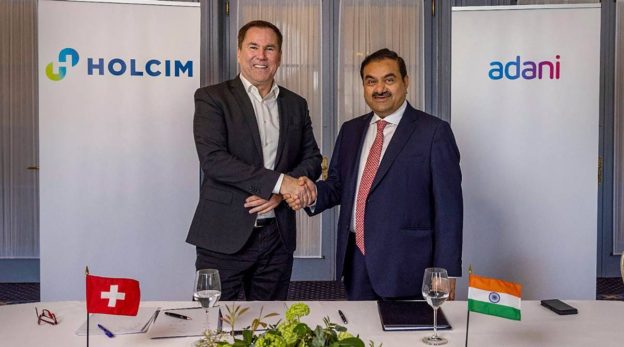On one hand the deal, which is the largest acquisition for the conglomerate, will make Adani Group the second largest cement player in the country. While for Holcim, it supports the plan to move towards its goal of increasing greener share in revenue by 2025.
Adani Group has agreed to buy Holcim’s India assets, ie, the two publicly listed cement companies Ambuja Cements and ACC in a $10.5 billion deal. Swiss cement maker Holcim Ltd has decided to exit the Indian market after doing business for 17 years in India. On one hand the deal, which is the largest acquisition for the conglomerate, will make Adani Group the second largest cement player in the country. While for Holcim, it supports the plan to move towards its goal of increasing greener share in revenue by 2025. Shares of Ambuja Cements were up 3.5 per cent while shares of ACC were up 7 per cent in early trade on Monday.
Here is a fact sheet on everything you need to know about the billion dollar deal:
- What is the deal value and size?
The Adani group has agreed to acquire Holcim’s India’s assets through an offshore special purpose acquisition vehicle for CHF 6.4 billion or nearly $10.5 billion. The deal is not just the biggest-ever acquisition by the Adani family, it is also India’s largest-ever merger and acquisition transaction in the infrastructure and materials space . The conglomerate has agreed to acquire 63.19 per cent stake in Ambuja Cements and about 54.53 per cent stake in ACC. The $10.5-billion value for the stake includes open offer consideration as well.
- Is the deal at a premium?
Adani has agreed to buy shares in Ambuja Cements for Rs 385 per share and shares in ACC for Rs 2300 apiece, according to the statement. Thus the $10.5-billion deal is at a 4 per cent premium (for both ACC and Ambuja) from last close on April 13, when the news about Holcim’s plans were first reported by Bloomberg News. If one looks at the share price from Friday’s close, Adani is buying Ambuja at over 7 per cent premium and ACC at about 8 per cent premium.
- What will be Adani Group’s market share after deal completion?
The deal, which according to wealth manager PhillipCapital is a “master stroke”, will immediately propel Adani group to the second slot in cements sector. The company will be next only to UltraTech Cement, which has a capacity of 120 million tonne per annum. Other big players in the cement industry are Shree Cement and Dalmia in India.
The total production capacity, by combining both ACC and Ambuja, will add a 70.9 mtpa capacity of cement production for infrastructure-to-energy conglomerate Adani. Ambuja Cements has an installed capacity of 31.45 mtpa, with the retail segment contributing to about 80% of its sales. ACC has a production capacity of 34.45 mtpa of cement, and together these companies have a total production capacity of 65.9 mtpa.
- Who were other bidders for the deal?
According to various media reports, apart from Adani Enterprises, companies such as industrialist Sajjan Jindal-led JSW Group, Dalmia Bharat, Aditya Birla Group’s UltraTech Cement Ltd and ArcelorMittal were also believed to be in the race for Holcim Group’s Indian assets. According to the Financial Express, JSW Group was intending to place a $7-billion bid for the twin assets, with $4.5 billion from its own kitty and the remaining $2.5 billion to be raised from private equity players.
- Why did Holcim exit?
According to Holcim, the company wants to make its revenues green. The company had laid out its Strategy 2025 and to lead with sustainable building solutions. The company has already exited or divested various cement assets in countries such as Brazil, Northern Ireland, Sri Lanka, Malaysia and Russia. At the same time it has been on a spree to buy greener assets in Europe and the United States to augment its solutions & products revenue.
“In the last twelve months, we have invested CHF 5 billion in Solutions & Products as a new growth engine for the company, while continuously pursuing bolt-ons in aggregates and ready-mix concrete. Holcim is ready to seize further opportunities, in line with our ‘Strategy 2025 – Accelerating Green Growth’, to become the global leader in innovative and sustainable building solutions,” Holcim said in a statement Sunday.
- And what does the deal mean for the Adanis?
It is interesting to note that India is the second-largest cement producer in the world, accounting for about 8% of global cement production. The deal has potential to turnaround the fortunes for the whole (cement) industry and not just theirs (Adani), according to PhillipCapital.
Just like any other deal, the deal will now have to be approved by the competition regulators and authorities and is expected to close in the second half of 2022. ICICI Securities was the advisors to Adani on the transaction. ICICI Securities Limited and Deutsche Equities India Private Limited are acting as joint Managers to the open offer.
https://www.financialexpress.com/industry/six-key-details-of-adanis-acquisition-of-ambuja-acc-from-holcim-a-fact-sheet-on-indias-largest-cement-deal/2526036/





